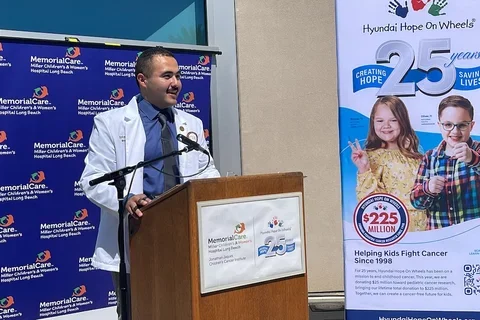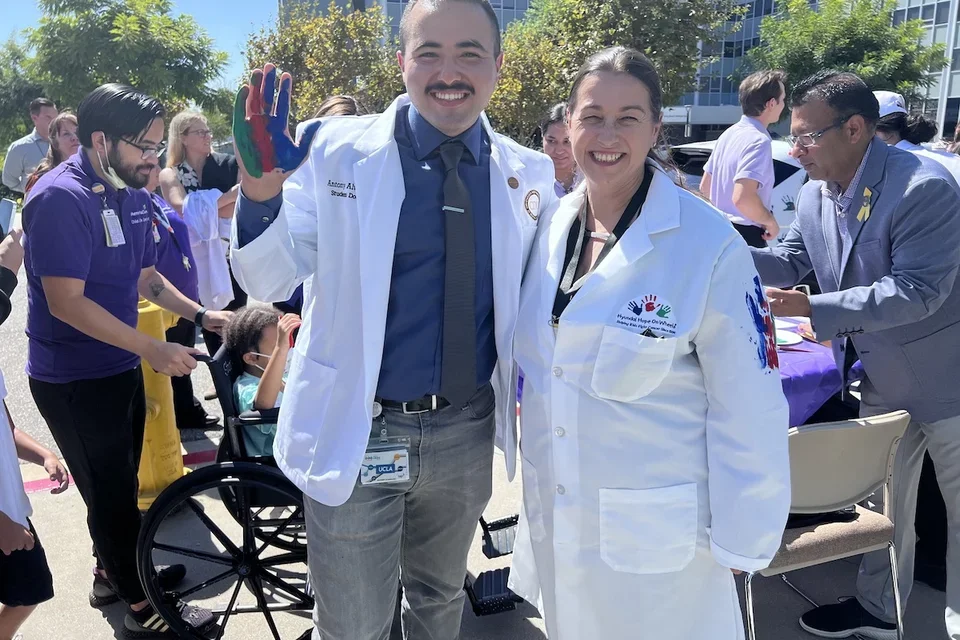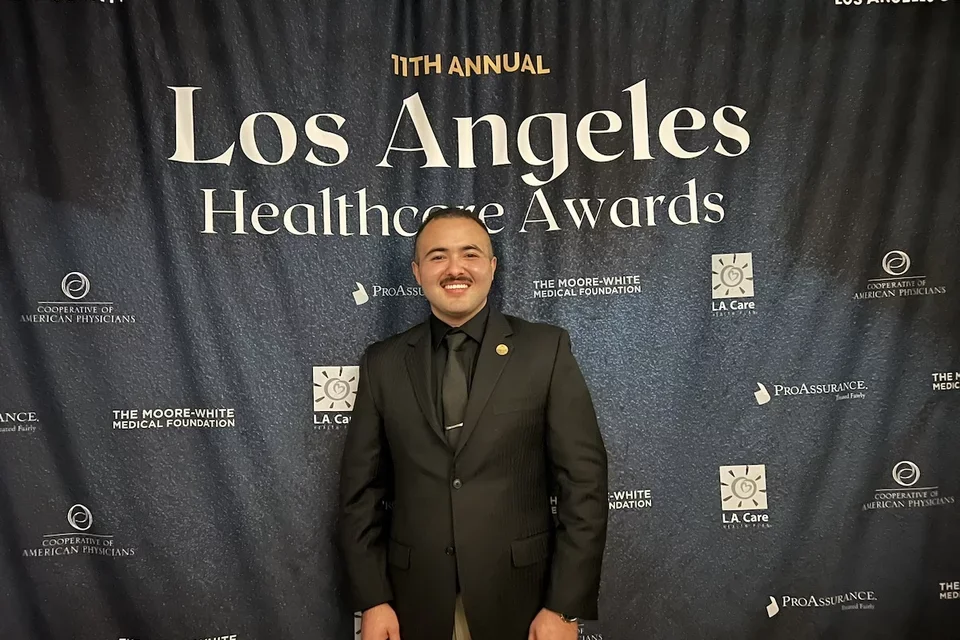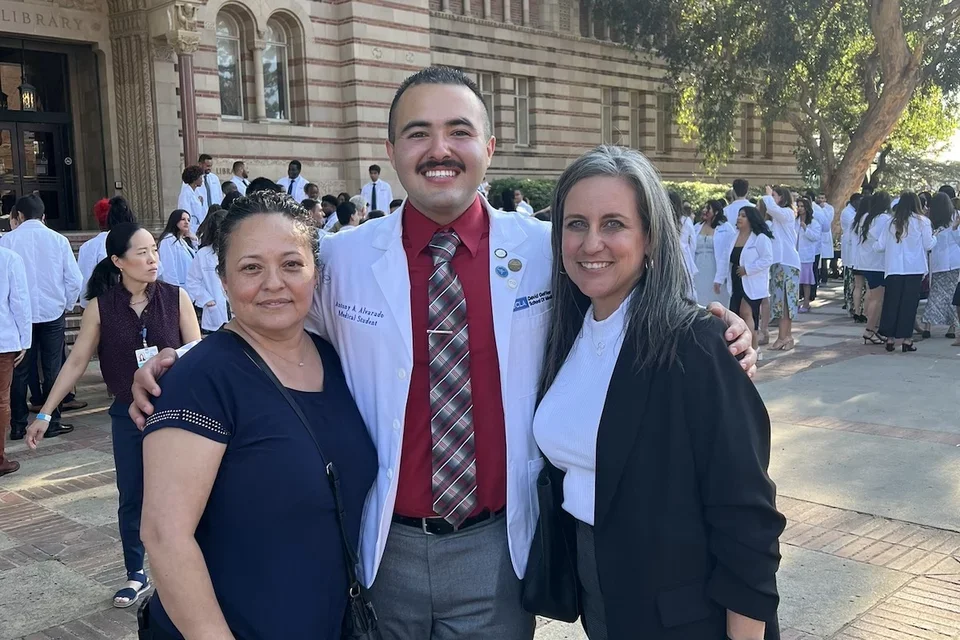Multiple Cancer Diagnoses Inspire Antony Alvarado’s Medical Career Dreams
Student Spotlight

Meet Antony Alvarado
In 2009, Antony Alvarado ended the year like any other healthy nine-year-old boy. Less than a month later, he learned he had a brain tumor.
Processing the diagnosis and adjusting to a new lifestyle involving brain surgery and recovery was challenging to say the least. Fortunately, his recovery went relatively smoothly. By the end of 2010, he’d regained his short-term memory as well as the ability to walk, run, eat, and dress himself.
He credits recording both big and small daily events in a memory journal for helping him rebuild his short-term memory.
“When I was in the hospital, I wrote down who came to visit me every day.”
He also tracked his meals, via sketches of plates and trays, to stop himself from asking what he’d be eating next just 15 minutes after he’d finished eating. If and when he asked anyway, someone—usually his mother—could point to his journal and his recent sketch.
“You drew that 15 minutes ago,” his mother would remind him. “We can't give you more food.”
Recovering well from surgery wasn’t the only gift 2010 had in store. Before year’s end, Antony’s magnetic resonance imaging (MRI) scans came back clean.
Fun Fact: Antony considers photography his favorite and most fulfilling creative outlet.
This hobby holds special meaning for him because it intertwines with his medical experiences. In 2021, he received a generous gift from the Make-A-Wish Foundation: a brand-new camera.
“When I pick up my camera, it feels like a continuation of that wish,” Antony says. “I love being able to document my life and document the world around me. I’ve made it a point to use my photography to capture disparities in my home of Wilmington, California, and to highlight my loving and enduring community, my fellow cancer warriors, and Latinx representation in medicine.
A second cancer diagnosis reinforces Antony’s calling
In 2017, on the seventh anniversary of Antony's first cancer diagnosis, his medical team found several new metastatic tumors throughout his brain and spine. He was just sixteen years old.
Looking back, Antony sees his second diagnosis as nothing short of miraculous. His MRIs had been returning clean, so his care team had been gradually increasing time between scans. If no one had caught his newly developing tumors on this scan, he likely wouldn’t have had another for two years—enough time to radically alter his prognosis.
“I owe that diagnosis to the radiology technician taking care of me that day,” Antony says. “They took the initiative to do a more detailed scan than the one that was ordered. That more detailed scan revealed a lingering tumor and prompted additional scans that detected even more tumors.”
Antony’s physicians advised against another brain surgery; they worried the side effects would be more severe—unmanageable even—the second time around. So he spent thirteen months getting chemotherapy treatments every week while also finishing his senior year of high school.
He feels incredibly fortunate to have a tight-knit, supportive family headed by a strong, single Latina mother. His loved ones made all the difference during this harrowing time, standing by his side and keeping his hope alive. His sister, for example, rearranged her life to take him to every chemotherapy appointment.
As of this writing, Antony is in what he likes to call a stable condition. Recent scans show no evidence of cancer growth.
“I don’t like to use the word ‘remission’ anymore,” he explains. “I know there’s always a possibility it can continue spreading.”
Antony feels unspeakably grateful for his encouraging test results, for the life he’s been able to enjoy, and for the personal healthcare experience that reaffirmed what he wanted to do with the rest of his life.
“I want to be a doctor because I realize that me sitting here today is a miracle in itself.”
When he was first diagnosed, his care team said the pressure that had built up in his brain likely would have killed him in a matter of hours—if he hadn’t been rushed to the hospital.
“Life gave me a gift. I went from being hours away from death to being here, fourteen years later,” Antony says. “I want to be able to provide the same services and the same quality care that I received. I want to help other kids beat cancer.”

Identifying as both a patient and an aspiring physician
The care experience that reinforced Antony’s commitment to becoming a doctor overlapped with his first hands-on laboratory position with the Latino and African American Health Internship Program (LA-HIP) at the Children’s Hospital of Los Angeles.
“During the week, I was the scientist contributing to the development of an immunotherapy targeting pediatric medulloblastoma tumors,” Antony recalls. “On the weekend, I was the patient receiving the best care and medicine available and also experiencing the full spectrum of side effects.”
Getting both the patient and physician perspective during his second round of cancer treatment sparked his interest in the translational research side of the care continuum. Furthermore, having such a comprehensive view of the healthcare landscape reinforced how much value his unique perspective and experience could offer patients and the field of medicine overall.
Antony feels unspeakably grateful for the compassionate medical care he’s received over the years. He was, however, astounded that he didn’t see a single Latinx physician until he’d been in and out of treatment for nearly a decade.
“My lived experience drives my desire to bring the newest scientific developments to the community, particularly communities like my hometown of Wilmington, California—communities made of people who are Latinx, undocumented, under-represented, under-resourced, or under-served in medicine,” he says.
“I recognize the immense privilege that comes with being a Latino UCLA medical student—one who was born and raised in the Latino hub of Wilmington and who will soon be joining the 6% of practicing physicians who identify as Latinx.”

Training to become a doctor—close to home
When the time came to select a medical school, Antony chose the CDU/UCLA Medical Education Program (MEP) offered jointly by the David Geffen School of Medicine at UCLA (DGSOM) and Charles R. Drew University (CDU). The pathway focuses on health equity and hands-on clinical experiences that prepare students to care for under-served populations. (Beginning with the class of 2028, this program will become the Urban Health Equity Pathway.)
It seemed designed to help Antony do all he wanted to do in his medical career.
On top of that, Antony loved the idea of returning home to attend medical school. He’d ventured east, to the University of Rochester, to complete his undergraduate education. While he couldn’t be happier with that decision or more appreciative of his east-coast college experience, L.A. felt like where he was meant to be.
“Having been gone helped me appreciate how much my family means to me, and how important it is to have them close by,” Antony says.
He loves knowing they’re only a 30-minute drive away and simply feeling their supportive presence even when they’re not physically together. Having this strong support system, and refining his study skills and strategies, has been enormously helpful in weathering med school’s academic pressures. He’s learned to value active engagement over reviewing and rote memorization. He tests his knowledge using flashcards and sample exam questions.
“Studying in the way that I'm studying now is actually very fun,” he says. “I get to engage with the material, and believe it or not, I actually don't take any notes. I just find ways to repeatedly interact with the content and bring it to the front of my mind.”
These methods, he knows, will continue serving him well after he finishes school.
“When I'm out on the wards, I'm not going to have access to a pile of notebooks that I can reference,” he explains. “I have to store all the information in my brain and be able to access it at any time.”
Antony’s redoubled study efforts haven’t barred him from embracing extracurricular activities. He’s president of his class of 2027 CDU/UCLA MEP cohort, a co-coordinator of the Latinos in Surgery interest group, and a co-leader of the Christian Medical & Dental Association (CMDA). He’s also pursuing a variety of research projects with the Department of Neurosurgery.
“The opportunity to represent our cohort through casual conversations throughout Los Angeles, speaking at our White Coat Ceremony, and representing CDU in prominent community spaces such as the Miller Children's Hospital of Long Beach has been an honor,” he says. “I hope to harmonize the interests and needs of our cohort, to ultimately be a unifying and representative voice for our class.”

Approaching the future with a light, yet full, heart
Antony’s extensive medical history makes him see his medical education and training as a process of transforming from patient to physician. Even when he officially becomes a physician, he knows his identity as a patient will deeply inform his practice and his overall approach to life.
“My experiences made me realize that life is very serious, but that you also can't take everything too seriously,” he says. “You have to take things with a light heart and enjoy the time you have.”
While he believes in fully experiencing everything the present has to offer, he also nurtures plenty of significant future goals and plans.
Antony has his sights set on becoming a pediatric neurosurgeon. He dreams of one day performing surgery in the same hospital where he had his: MemorialCare Long Beach Medical Center. More broadly, he finds joy and motivation in picturing his future patients—patients with backgrounds that align with his own, who come from medically marginalized communities.
The idea of serving them and their loved ones during the most uncertain and critical points in their lives means everything to Antony.
“I look forward to standing alongside my medical team and consulting with patients and their families as a living testimony of medicine’s gifts,” he says. “I look forward to advocating, representing, and serving Latinx patients and being the Latinx physician I hoped to see since my first diagnosis in 2010.”



